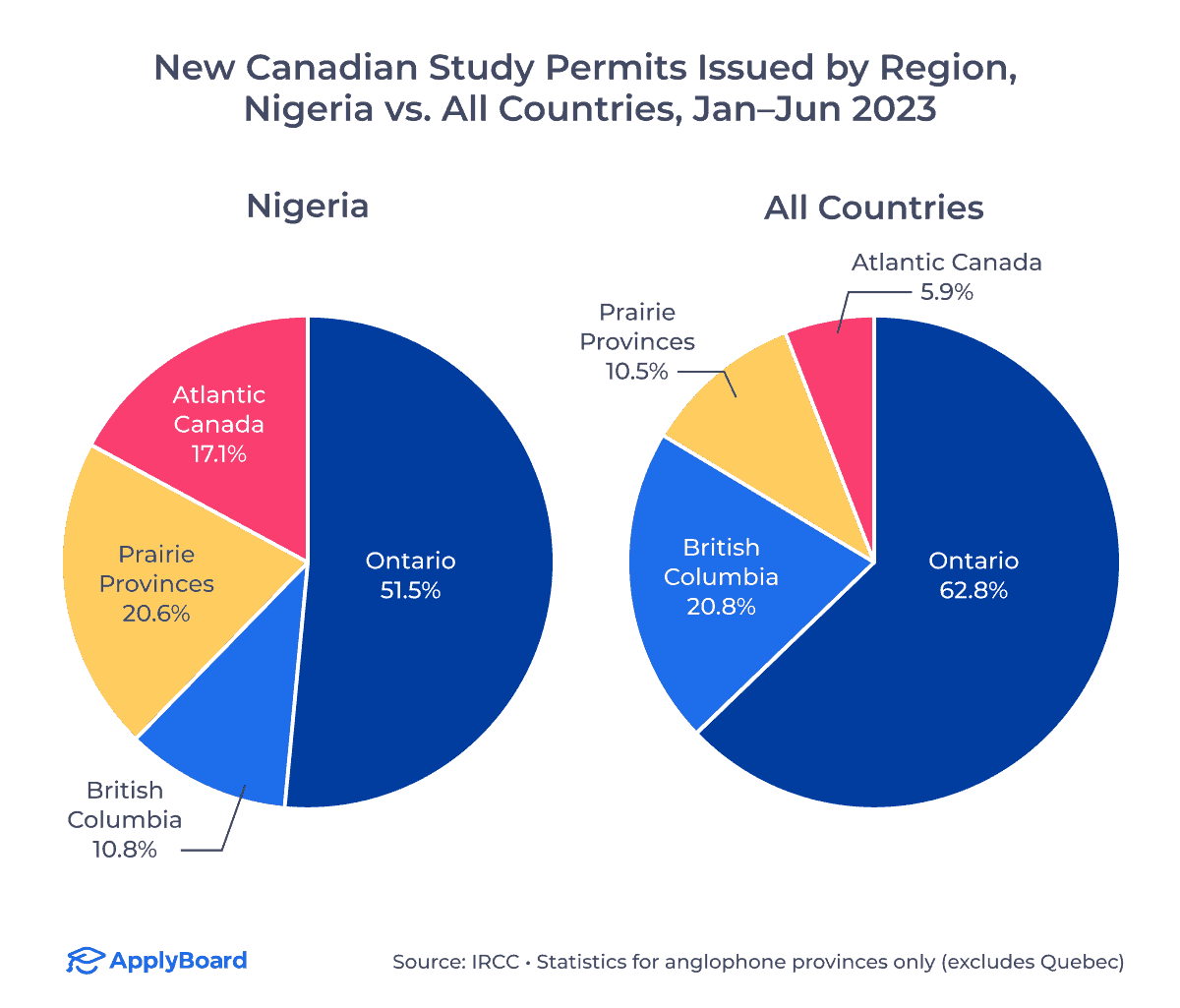Nigerian student mobility to Canada is increasing at a momentous rate. The Canadian government issued just over 3,000 student visas1 to Nigerians nationals in 2019.2 By 2021, that number had doubled, and in 2022, it doubled again. Now, amid record numbers of international students coming to study in Canada, Nigerians have become the country’s fastest-growing student population.
The Nigerian population hit 217 million in 2022 and is projected to surpass 375 million by 2050, becoming the world’s third-largest population. Nearly 60% of Nigerians are under 24 years old.3 And the country’s GDP per capita is forecasted to increase by 55% by 2028.4 This is a country with a growing population and growing wealth, and demand for international education in Nigeria will only increase.5
With this in mind, we set out to dive deep into some of the student mobility trends around Nigerians for this week’s edition of ApplyInsights. Read on to see a breakdown of Nigerian student inflows by province of destination and study level—and learn why inroads with Nigerian students are particularly vital for institutions looking to diversify their international student enrollment.
Key Insights at a Glance
- Nearly 18,000 Canadian study permits were issued to Nigerians in the first six months of 2023, more than for any other but India.
- Nigerians were Canada’s fastest-growing international student population from January to June 2023, with 44% more study permits issued during that period than in full-year 2022.
- Study permit approval rates for Nigerians continued to rise across the first six months of 2023, to just under 40%. That’s more than double what approval rates were in 2020.
- Nigerian students are more evenly distributed across Canada than average. Manitoba, Nova Scotia, Saskatchewan, and New Brunswick each accounted for more than 5% of study permits issued to Nigerians from January to June 2023.
Growing Canadian Student Visa Numbers for Nigerian Students
Nigerian students have long coveted a Canadian education. From 2017 to 2019, the Canadian government processed more student visa applications from Nigeria than any other country except India and China. But a study permit approval rate below 20% meant that only a small proportion of those students were able to realize their dream of studying in Canada.
Fast forward four years. Approval rates have nearly doubled, and Nigerian students have noticed. Nigerians submitted more than 43,000 study permit applications across the first six months of 2023 and appear likely to become Canada’s second-largest cohort of inbound students this year.
The charts below track the growth in study permit applications processed, study permits issued, and study permit approval rates for Nigerian students since 2017:
This cross-chart comparison shows a strong relationship, with a spike in approval rate in 2021 followed by a surge in application volumes in 2022. ApplyBoard’s recruitment partners in Nigeria have confirmed that enthusiasm for a Canadian education is palpable in the country. And while the approval rate for Nigerian students (39.9%) remains well below the average for all countries (60.3%), our partners say that students are largely focused on the rising rates rather than the ongoing disparity.
Will Canadian Student Visa Approval Rates Continue to Rise for Nigerian Students?
Given that Nigerian student inflows are so dependent on approval rates, it’s fair to ask whether those rates will remain stable. Canadian student visa approval rates are notoriously volatile and difficult to predict. Nevertheless, there’s reason for optimism.
The Canadian government came under scrutiny last year for its low student visa approval rates for African students. This culminated in a study by the House of Commons Standing Committee on Citizenship and Immigration which laid out a series of recommendations for improving the fairness and transparency of the study permit approval process.6 While it’s too early to assess the impact this increased scrutiny may have had, approval rates have been on the rise for African countries post-pandemic. And we could expect a more equitable study permit approval process to raise approval rates across low-approval-rate countries.
Insufficient finances were cited as a refusal reason in 74% of study permit refusals for Nigerians in 2021 and 2022. Learn more about why applicants from certain countries are more likely to be refused a Canadian student visa.
Nigerian Students Are Interested in Studying Across Canada
The map below shows the number of study permits issued to Nigerian students from January to June by province of destination. It also includes the percentage of the full-year 2022 study permits issued numbers those half-year totals represent: 
Eight of 10 provinces saw more Nigerian students issued study permits in the first half of 2023 than in all of the previous year. Nova Scotia’s growth is particularly notable, with more than twice as many study permits issued as in full-year 2022. That was the third most behind Ontario and British Columbia.
While Ontario and BC were the top destinations, Nigerian students are far less centralized in those two provinces than average. The charts below show the distribution of new study permits issued across Ontario, British Columbia, the Prairie provinces, and Atlantic Canada for Nigerian students as well as the all-countries average:7

Across these four regions, Ontario and BC accounted for around 63% of study permits issued to Nigerians in the first six months of 2023. This was well short of the nearly 84% of students who chose those two provinces as a destination across all countries of origin.
In an international student ecosystem where students have become increasingly concentrated in Ontario in particular, Nigerians have shown an interest in studying across Canada. We highlighted Nova Scotia above, but Manitoba, Saskatchewan, and New Brunswick also attract a larger proportion of Nigerian students than the all-countries average.
Both Colleges and Universities Benefit from Nigerian Student Inflows
Nigerian post-secondary students have historically pursued a university education. But an increasing number of Nigerians are coming to Canada to study at the college level, as the charts below reveal:
Nigerians have long been interested in Canadian college programs, but single-digit study permit approval rates prevented many of those students from coming to Canada. This interest has risen dramatically now that college approval rates are near 40%. The Canadian government processed more than 21,000 study permit applications for Nigerian students applying to college programs from January to June 2023, versus 15,000 in full-year 2022.
As we discussed above, study permit approval rates are notoriously difficult to predict. But it seems likely that college approval rates will remain much closer to the university rates in the future. Across source countries, approval rates for college studies (55%) have been roughly five percentage points lower than those for university (60%) since 2021. Look for Nigeria’s differential to fall in line with the global average moving forward.
Nigeria has become a viable recruiting country for Canadian colleges. It was the third-largest source of international students for college studies last year and across the first six months of this year.
Despite this shift toward college, Nigerian students remain keen to study at Canadian universities. The Canadian government issued more than 6,500 study permits to Nigerian students for university studies in the first half of 2023, already a record for the full year. This was the second-most study permits issued to a nationality for university behind India, though we expect China to catch up with the fall intake.
Given the increasing centralization of international students at Ontario colleges, the Nigerian student population is an important corridor to maintain for the long-term health of Canada’s international education sector.
New UK Dependents Policy Likely to Be Boon to Canada
The United Kingdom announced in May that it would prohibit most international students from bringing dependents into the country. This policy change creates an opportunity for Canada to secure a significant recruitment advantage over its largest competition for Nigerian students.
Almost 67,000 Nigerians were granted UK dependent study visas between April 2022 and March 2023. This was the highest total for any source country and actually exceeded the number of Nigerians granted main applicant study visas over the same period. While some Nigerians with families may move ahead with their plans to study in the UK without their loved ones, many more will look to begin their study abroad journeys elsewhere, including Canada.
It’s important to note that this new restriction only affects students pursuing course-based master’s programs. Students in PhD and research-based master’s programs are exempt, and undergraduate students were already prohibited from bringing dependents with them to the UK. But Canadian universities should anticipate increased demand from Nigerian students for course-based master’s programs, and we expect some spillover into post-graduate programs at Canadian colleges as well. The new rules take effect on January 1, 2024.
Key Takeaways
With strong interest in both university and college studies, Nigerian students provide an excellent opportunity for institutions across Canada to improve the diversity of their international student populations. Institutions looking to continue to build their Nigerian enrollment would be well served to consider the following:
- Nigerians are among the oldest student cohorts and often bring spouses and children with them. In marketing to Nigerians, highlight supports your institution offers for students with families.
- Affordability remains a top concern among students worldwide, including Nigerians. Highlight regional cost-of-living advantages and on-campus housing options to help combat affordability concerns.
- Nigerian students are most likely to be refused a student visa for financial reasons. Share this insight with prospective students and encourage them to work with a counsellor who can help them understand how to minimize this refusal risk.
- Study permit processing times are historically poor for Nigerian students. Keep track of these numbers and help prospective students navigate deadlines by subscribing to our ApplySolutions dashboard.
Subscribe to ApplyInsights
Sign up for the latest insights on international education.

FOOTNOTES:
1. The terms student visa and study permit are generally used interchangeably for Canadian international students. Rather than a student visa, Canada provides an approved international student with a study permit, which allows that student to enroll in classes at Canadian institutions. When a student is accepted for a study permit, they are usually also provided with a visitor visa, which allows that student to enter Canada for their studies.
2. All data courtesy of Immigration, Refugees and Citizenship Canada (IRCC), except where noted. Statistics used in this article are for new study permits only.
3. United Nations, World Population Prospects 2022.
4. International Monetary Fund, World Economic Outlook Database October 2023.
5. The Nigerian currency, the naira, crashed in June, and its weakness may contribute to affordability challenges for Nigerian students looking to study abroad. While we expect demand from Nigerians to remain strong, we may see some Nigerian students deferring their 2024 studies in an attempt to wait out the economic situation.
5. While the study focused on francophone Africa, a number of witnesses who appeared before the Committee noted that many of the issues surfaced were present in anglophone Africa as well. Disclosure: ApplyBoard co-founder and then-CEO Martin Basiri was among the witnesses who appeared before the committee..
6. Data omits study permits issued for the territories (the Northwest Territories, Nunavut, and Yukon), as well as destination unknown or unspecified. We’ve also omitted Quebec as it is a very minor market for Nigeria (1%), where English is the official language, relative to the all-countries average (9%)



